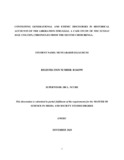Please use this identifier to cite or link to this item:
https://cris.library.msu.ac.zw//handle/11408/4067| Title: | Contesting generational and ethnic discourses in historical accounts of the liberation struggle : a case study of the Sunday Mail column , Chronicles from the second chimurenga. | Authors: | Huni, Munyaradzi Elias | Keywords: | contesting generational discourses contesting ethnicl discourses historical accounts liberation struggles second chimurenga |
Issue Date: | Nov-2018 | Publisher: | Midlands State University | Abstract: | Since the attainment of independence in 1980, Zimbabwe’s historiography has been dominated by what Byrnes (2012:3) refers to as “Big History.” This Big History, authored by self-glorifying former nationalists and complemented by willing commissar intellectuals of the early 1980s, silenced the narratives of former fighting forces from the Second Chimurenga, which brought the country’s independence. However, studies utilizing a bottom up approach that is capturing the voices of the less celebrated or rather marginalized former fighters are scare. Zooming on the narratives of these silenced former fighting forces, this study deploys Maurice Halbwachs’ concept of collective memory fused with Terrance Ranger’s patriotic history approach and post-colonial theory in examining the generational and ethnic contestations coming out of The Sunday Mail column, Chronicles from the Second Chimurenga. Utilizing a qualitative research approach and deploying archival research in data gathering, the study also examines how the liberation war account has been constructed in the midst of the generational and ethnic contestations in the column. Through critical discourse analysis and the presentation of data thematically, the study indicates that generational and ethnic contestations started way before the commencement of the Second Chimurenga. Furthermore, the study indicates that throughout the liberation struggle, there was mistrust between the former nationalists and the former fighting forces. The mistrust derailed the liberation struggle and the consequences are still being felt in Zimbabwe, 38 years after the attainment of independence. This study is an approach and a perspective from the silenced former freedom fighters who claim that their victory and history was stolen in 1980. Critically, the study shows ethnic and generational contestations defining Zimbabwe’s nationalistic history. | URI: | http://hdl.handle.net/11408/4067 |
| Appears in Collections: | Master Of Science In Media And Society Studies Degree |
Files in This Item:
| File | Description | Size | Format | |
|---|---|---|---|---|
| Dissertation for binding,.pdf | Full Text | 970.19 kB | Adobe PDF |  View/Open |
Page view(s)
258
checked on Feb 19, 2026
Download(s)
464
checked on Feb 19, 2026
Google ScholarTM
Check
Items in MSUIR are protected by copyright, with all rights reserved, unless otherwise indicated.



